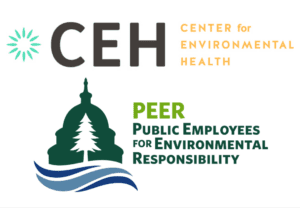EPA Conceals PFAS Health Info as Trade Secret
Lawsuit Demands Release of Data on PFAS in Fluorinated Containers
FOR IMMEDIATE RELEASE
Thursday, February 15, 2024
CONTACT
Kyla Bennett [PEER] [email protected], (508) 230-9933
Colleen Teubner [PEER] [email protected], (202) 464-2293
Bob Sussman [CEH] [email protected], (202) 716-0118
Washington, DC — The U.S. Environmental Protection Agency is wrongfully withholding test data and other vital information about the presence of dangerous perfluorooctanoic acid (PFOA) and other toxic per- and polyfluoroalkyl substances (PFAS) in millions of fluorinated plastic containers, according to a federal lawsuit filed today by Public Employees for Environmental Responsibility (PEER) and the Center for Environmental Health (CEH). The suit contends that EPA is violating its disclosure obligations under the Toxic Substances Control Act (TSCA) by improperly treating health and safety data as “confidential business information” (CBI) and denying the public access to the results of testing showing the levels of PFAS in plastic containers and their contents along with the identities of the products in which these toxic materials are present.
PFOA and twelve other PFAS chemicals are formed during the fluorination of high-density polyethylene (HDPE) plastic containers by Inhance Technologies, LLC of Houston, Texas. Inhance is the sole U.S. company conducting this type of fluorination. Studies by EPA, independent researchers, and Inhance itself show that PFAS leaches from the walls of containers into their contents, thus exposing millions of people to PFAS without their knowledge. Exposure to PFAS is associated with liver, kidney, and testicular cancer, thyroid problems, reduced immune function and vaccine efficacy, and impaired fetal development, among other harmful health effects. Inhance fluorinates 200 million containers a year which are used to package diverse products ranging from fuels to foodstuffs, cosmetics, and cleaning products which consumers and workers use on a daily basis.
On January 5, 2023, PEER and CEH submitted a Freedom of Information Act (FOIA) request for documents shedding light on the health risks associated with PFAS in fluorinated containers. In its response, the agency withheld the results of extensive testing for PFAS conducted by Inhance and detailed information received from the company about the products packaged in fluorinated containers. In so doing, the suit charges, EPA has granted trade secret protection at Inhance’s request for information that TSCA requires the agency to make available to the public.
“The cloak of confidential business information cannot be used to hide health and safety studies as EPA is currently doing,” stated Colleen Teubner, PEER’s Litigation and Policy Attorney. “By sitting on this critical information, EPA is advancing the private interests of a corporate violator and shirking its public health responsibilities.”
PEER and CEH filed their FOIA enforcement suit against EPA in the U.S. District Court for the District of Columbia. In addition to withholding health and safety data required to be disclosed by TSCA, EPA is still processing their FOIA request and has not yet produced hundreds of responsive documents.
On December 3, 2023, EPA issued orders under TSCA determining that the PFAS in fluorinated containers constitute “an unreasonable risk of injury to health or the environment” and directing Inhance to stop producing PFAS during fluorination no later than February 28, 2024. A full response to the FOIA request, including disclosure of the unlawfully withheld data, will better enable the public to understand the basis for these orders and the risks to consumers and workers of handling and using PFAS-containing fluorinated containers. The EPA orders are currently being challenged in the Fifth Circuit Court of Appeals by Inhance.
“EPA has found that these containers constitute a public health threat, a long-awaited determination that also should encompass the public’s right to know,” added CEH counsel Bob Sussman, a former senior EPA official. “Given the unquestionably major public health stakes, EPA should be stepping up and maximizing access to health and safety data, but the agency is disclosing vital information only grudgingly and with lingering secrecy even though disclosure is mandated by TSCA.”
